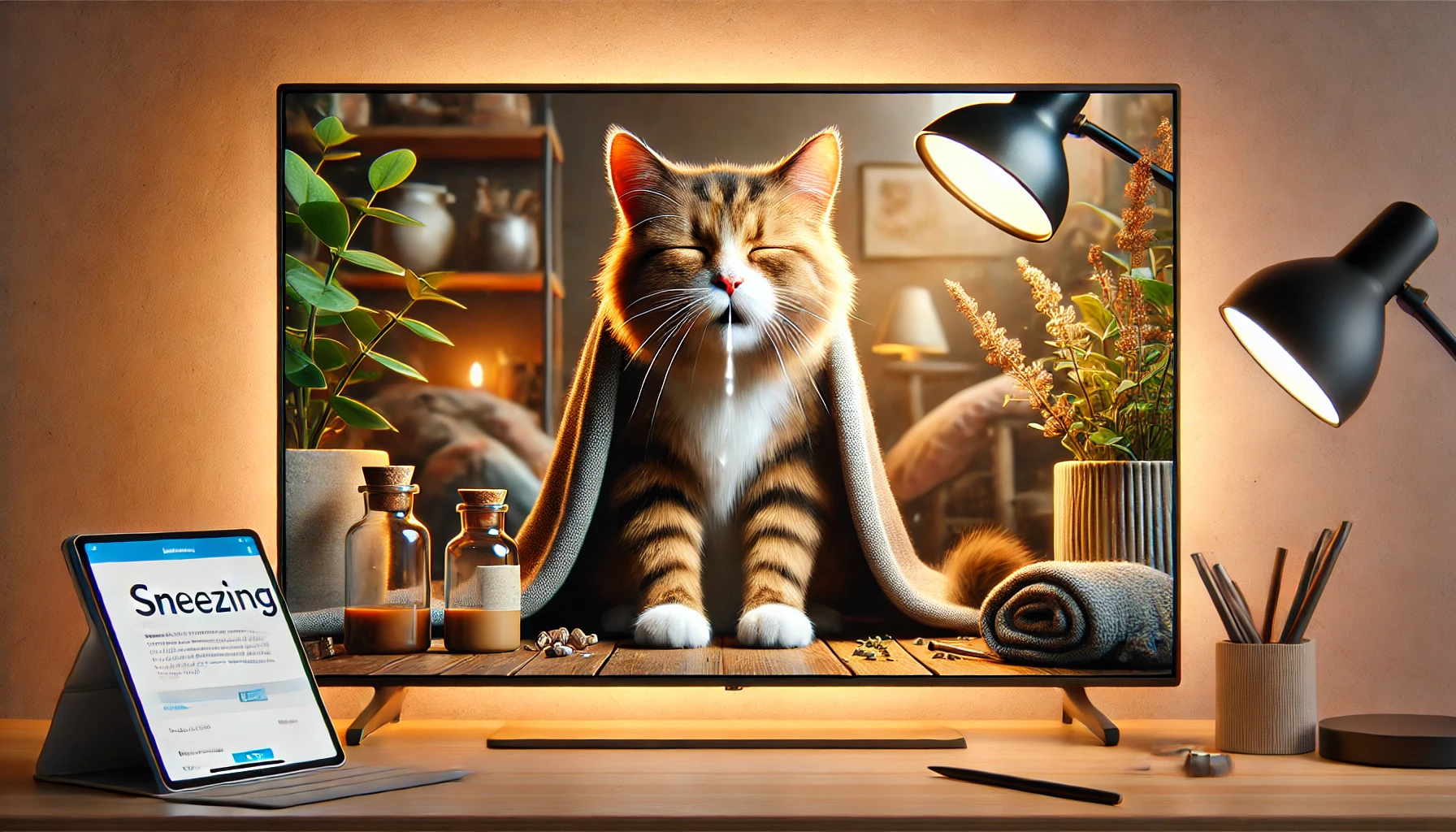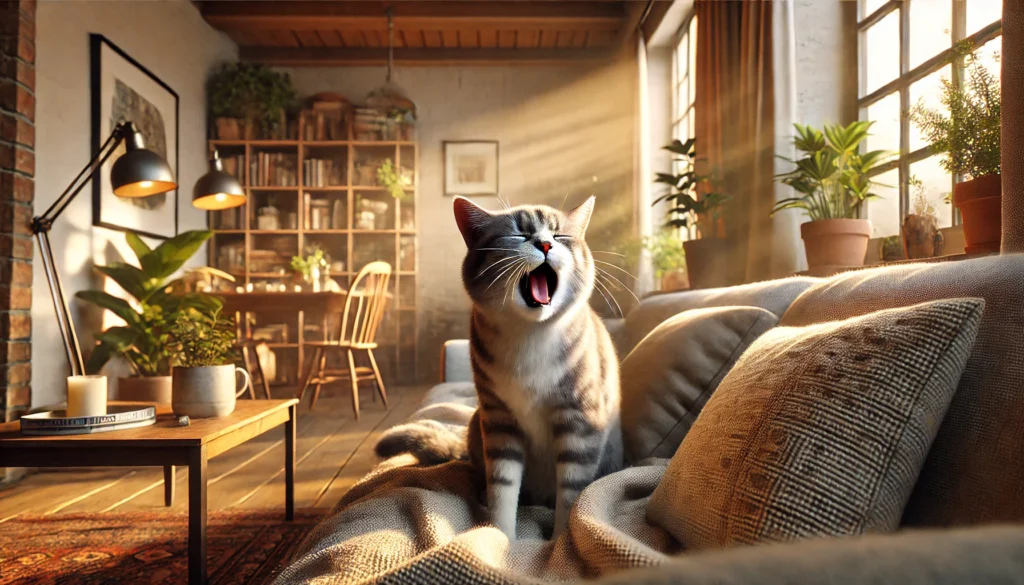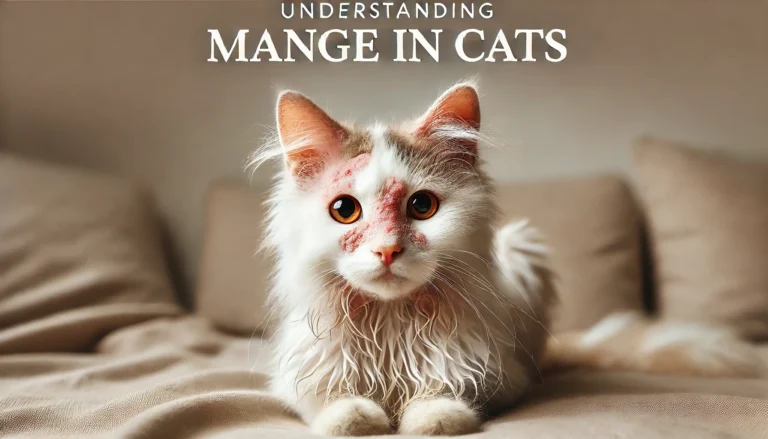Why Is My Cat Sneezing?

My Cat Sneezing can be as innocuous as a tickle in their nose or as serious as an underlying health condition. This comprehensive guide will delve into the common causes of sneezing in cats, home remedies, and signs that indicate a visit to the vet is necessary. We’ll explore the anatomy of a sneeze, the environmental and medical triggers, and much more to ensure you’re equipped to keep your cat healthy and comfortable.
1. Understanding Cat Sneezing
1.1 My Cat Sneezing?
Definition and Mechanism: My Cat Sneezing is a forceful expulsion of air from the lungs through the nose and mouth, a reflex intended to clear the nasal cavity of irritants or foreign particles.
1.2 Normal vs. Concerning Sneezing
Occasional Sneezing: Occasional My Cat Sneezing are normal and can be caused by simple irritants like dust.
Persistent Sneezing: If your cat keeps sneezing frequently or exhibits more severe symptoms like sneezing blood, it may indicate a health issue that needs veterinary attention.
2. Common Causes of Sneezing in Cats
2.1 Environmental Triggers
Allergens and Irritants: Common allergens include pollen, mold, and household dust, which can cause sneezing in sensitive cats. Strong odors from cleaning agents or perfumes also trigger sneezing.
2.2 Infections
Viral and Bacterial: Conditions like feline herpesvirus and calicivirus cause upper respiratory infections leading to sneezing, congestion, and nasal discharge. Bacterial infections may also result in green snot or yellow mucus.
2.3 Other Causes
Foreign Bodies and Chronic Conditions: Occasionally, foreign bodies like grass seeds in the nasal passages or conditions like chronic rhinitis can lead to sneezing.

do you know
The Norwegian Forest Cat, known for its robust build and striking appearance, is a beloved breed with a rich history and unique characteristics.
3. Diagnosing Sneezing in Cats
3.1 When to Visit the Vet
Symptoms to Watch For: Frequent sneezing, especially with discharge or blood, warrants a vet visit. A My Cat Sneezing a lot with snot, displaying a white nose, or showing signs of discomfort are all cues to seek professional advice.
3.2 What to Expect at the Vet
Examinations and Tests: The vet may perform a nasal flush, take X-rays, or conduct allergy testing to determine the cause of sneezing.
4. Treatment Options for Sneezing in Cats
4.1 Medications
Antibiotics and Antivirals: Depending on the cause, your vet might prescribe medications to treat infections. Antihistamines may be used for allergies.
4.2 Home Remedies and Care
Managing the Environment: Reducing allergens by using air purifiers and keeping the home clean can help. Humidifiers can also relieve sneezing caused by dry air.
5. Preventive Measures and Home Care
5.1 Reducing Exposure to Irritants
Clean Living Spaces: Regularly cleaning your home and avoiding the use of strong perfumes or smoke can prevent sneezing episodes.
5.2 Dietary Considerations
Boosting Immune Health: A healthy diet supports your cat’s immune system, potentially reducing the frequency of sneezing caused by infections.
6. When to Worry About Sneezing
6.1 Signs That Require Immediate Attention
Severe Symptoms: If sneezing is accompanied by other symptoms like excessive nasal discharge, difficulty breathing, or lethargy, immediate veterinary care is crucial.
6.2 Chronic Sneezing Issues
Long-term Management: Chronic conditions such as allergies or recurrent infections might require ongoing treatment or lifestyle adjustments to manage symptoms effectively.
7. Conclusion
Understanding the causes and remedies of your cat’s sneezing can help you provide better care and prevent more serious health issues. Regular veterinary visits, a clean environment, and attentive care at home are key to managing your cat’s health. Remember, while occasional sneezing is normal, persistent sneezing warrants a deeper look by a professional to ensure your furry friend stays happy and healthy.
When should I worry about my cat sneezing?
Worry if sneezing is frequent, accompanied by discharge, especially if bloody or colored, or if your cat shows other signs of illness like lethargy or reduced appetite.
How do I help my sneezing cat?
Keep your home free from irritants like smoke and strong scents, use a humidifier to ease breathing, and ensure your cat stays hydrated and well-rested.
Do cats sneeze when they are sick?
Yes, sneezing can be a symptom of illness in cats, particularly if it’s frequent or accompanied by other symptoms like a runny nose or eye discharge.
Do cat colds go away on their own?
Many mild cat colds can resolve on their own with supportive care, but monitoring is crucial as complications can develop, necessitating veterinary care.
How can I treat my cat’s cold at home?
Provide a warm, comfortable space, ensure your cat remains hydrated, offer palatable food, and use a humidifier to help ease congestion.
How to cure cat flu at home?
Similar to treating a cold, keep your cat warm, hydrated, and quiet. Gently wipe nasal and eye discharges with warm water, and encourage your cat to eat. However, severe cases require veterinary attention.
What are the first signs of cat flu?
Early signs include My Cat Sneezing, nasal and eye discharge, fever, lethargy, and a loss of appetite.
Can cat flu spread to humans?
Cat flu cannot be transmitted to humans; it is specific to feline species.
How to treat a sick cat without going to the vet?
For mild illnesses, provide comfort with a warm bed, fresh water, and easy-to-eat foods. Note: Always consult a vet if the condition doesn’t improve or worsens.
How to tell if a cat is suffering?
Signs of suffering include changes in behavior, persistent hiding, decreased appetite, vocalizing more or less than usual, or showing changes in mobility. Prompt veterinary consultation is advised to assess their condition.






